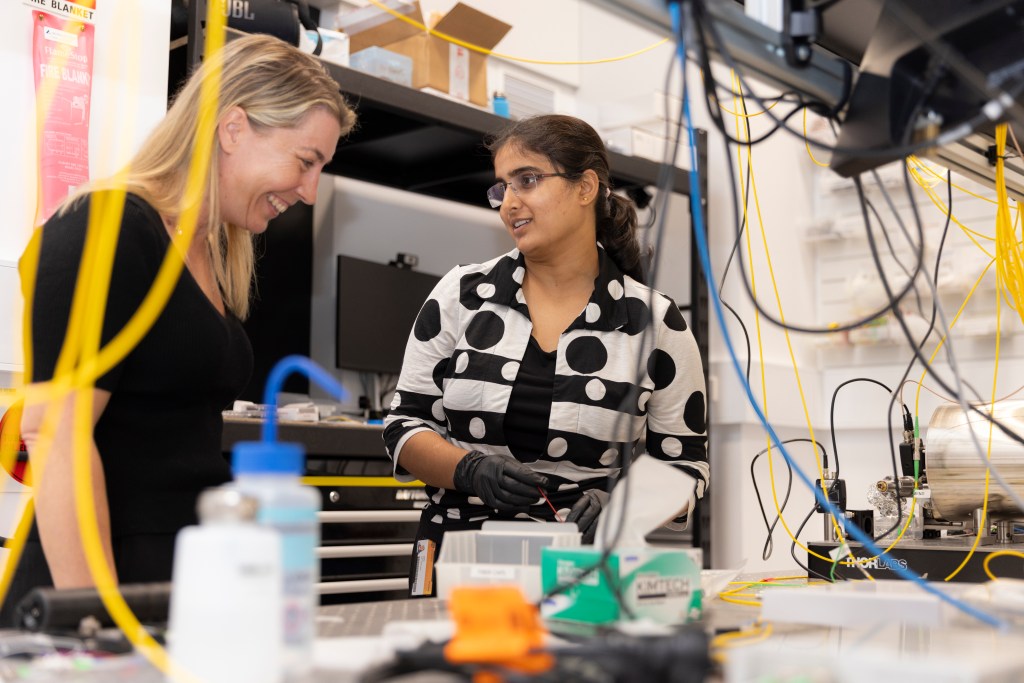Opinion: The national conversation on productivity is stuck on AI. It’s understandable, and short-sighted. But Australia’s excellence in quantum can capture high-value growth that can reverse our productivity decline, writes Petra Andren.

Australia’s productivity is in a slump. The latest figures from the Productivity Commission are not just numbers on a page, but a warning sign. As a nation, we seem to be working harder but not smarter, signalling an unsustainable trend if the trend continues.
In the ongoing debate about Australia’s economic future, AI dominates the conversation. But while AI is a powerful optimiser, it works within the confines of our existing systems. The real opportunity lies in quantum technology. It offers a fundamental leap in capability that goes beyond making processes faster and instead unlocks entirely new ways of completing tasks, providing a genuine path to break our economic inertia.
What is the big deal about quantum?
The national conversation on productivity is stuck on AI. Given the novelty of the technology and ongoing conversations about whether it will replace Australian jobs or not, that’s understandable. But it’s also short-sighted.
We need to consider the nature of the problem we’re trying to solve through the lens of our regular, classical computers versus quantum computers. If a classical computer is a candle and AI is a lampshade that directs its light, quantum is the invention of the light bulb. It’s a completely different class of technology.
It works by harnessing the physics of the subatomic world to solve problems that are impossible for even the world’s biggest supercomputers. In this example, quantum computers are only the tip of the iceberg; the applications of quantum computing are virtually limitless.
For a nation like Australia with a deep history of quantum research excellence, this presents a strategic imperative to capture the kind of high-value growth that can reverse our productivity decline.

CSIRO forecasts that quantum technology could add over $6 billion to our economy and create 19,400 new jobs by 2045. These figures are likely conservative, given that the UK’s Oxford Economics estimates suggest quantum could boost productivity by up to 7% by 2045 — equivalent to £212 billion (AU$438 billion). Both sets of data set a positive baseline and highlight the significant growth potential if Australia acts decisively.
Quantum in action
Quantum applications are already delivering billions of dollars in value to the Australian economy. The most famous example comes from the red earth of our mining sector. Using a technology called LandTEM, CSIRO deployed ultra-sensitive quantum sensors to peer deep underground, helping to detect potential nickel deposits in Western Australia.
This avoids years of expensive, speculative drilling. The result? This Australian invention has already helped uncover $10 billion globally, including $4 billion worth of ore deposits right here in Australia. What’s more, LandTEM also saved exploration costs by nearly a third. This incredible success proves Australia can invent and apply world-leading quantum solutions. But it also raises a more critical question.

The discussion about quantum’s role in our economy splits into two parts: how we use the technology, and who gets to build and own it. With AI, that second question was answered for us. Australia is a nation of savvy AI users, but the foundational companies — the Nvidias and OpenAIs — are foreign-owned. With quantum, we’re only at the starting line. We have a once-in-a-generation opportunity to ensure the foundational platforms and companies of this new technological age are created and owned by Australians.
If quantum technology can so profoundly change a traditional industry like mining, imagine its impact elsewhere. This same capability, if leveraged, has the potential to redefine water efficiency in agriculture by mapping aquifers with unparalleled precision. In healthcare, it could lead to groundbreaking new diagnostics, and quantum computing promises to collapse the timelines for discovering life-saving drugs.
These are not marginal gains. They are foundational blocks for a more intelligent, resilient, and profoundly more productive Australian economy.
The need for a national coordinated approach
The quantum opportunity, however, will not be served on a silver plate. World-class research is a starting point, and not a guarantee of success. Reports like the recent analysis from StartUs Insights identify Sydney as one of the world’s key urban hubs for quantum innovation. This is a fantastic first step and a testament to the expertise and talent that we have.
But one successful city, at this early stage, does not equal a successful nation, at least not long-term, if we want to become the true and lasting leaders. Instead, we need to focus on education in quantum technologies and bridge the gap between Australia’s brilliant labs — wherever they are in the country — and the industries that are the end-users, as well as the global market.
“A serious investment in quantum isn’t another line item in the budget; it’s a down payment on our future economic sovereignty.”
Petra Andren
The choice for Australia is simple. We can either keep applying band-aids to our productivity problem or embrace the technology that offers a genuine cure. The government’s current focus on innovation and modern tools is the right one, but the conversation must get bigger.
The quantum success, and therefore greater productivity, relies on industry, government, and research institutions working in tandem to build companies, fund scale-ups, and train the quantum-ready workforce of tomorrow. The quantum revolution is here, and Australia has the talent and vision to play a key role in it, with great potential to build a more prosperous nation for generations to come.
Petra Andren is a recognised innovation leader and venture builder, currently serving as CEO of Quantum Australia. With more than 25 years of global experience across advanced technology sectors and markets, she is now spearheading the development of a nationally coordinated quantum ecosystem—positioning Australia at the forefront of global quantum innovation and economic impact promoting quantum tech as a productivity multiplier.
Look back on the week that was with hand-picked articles from Australia and around the world. Sign up to the Forbes Australia newsletter here or become a member here.


